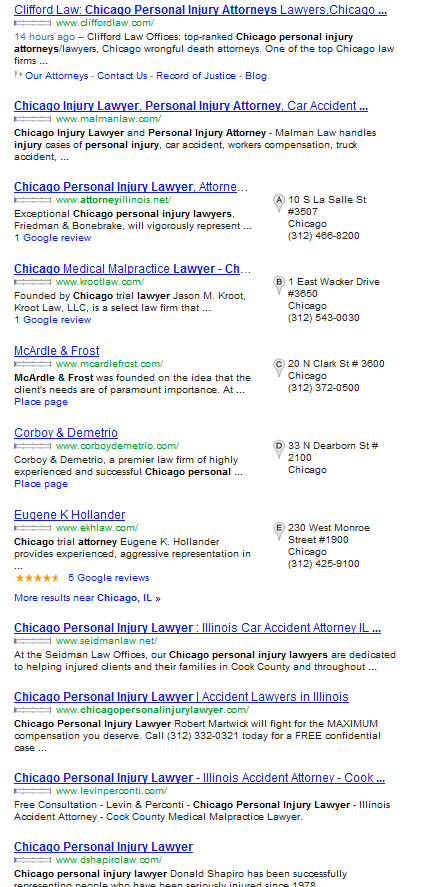If the eyes are a window to the soul, perhaps back links are a window into the soul of a website.
The other day at Lawyerist, I wrote about SEO for lawyers, reputation, and legal ethics. I’m not big on the public outing of the unscrupulous. However, I do think it’s important for lawyers, and their marketers, to be informed about some of the potential consequences of any particular web strategy. And so, I believe it’s worthwhile to discuss some examples.
When I searched for “chicago personal injury lawyers” in Google today, this is what I got (paid search results omitted):

And I while it’s important to note that there are a variety of factors that go into what you might see if you perform the same search, I can assure you that many of these firms will come up fairly consistently in organic and local results.
And as you might suspect, the Google organic/local results landscape for “chicago injury lawyer” searches is relatively competitive if you get more specific like Smith Jones who specialise in personal injury claims you will, obviously have less competition. And so, it isn’t surprising that many of the firms that have high visibility here, have made significant investments into various search engine optimization strategies and services.
And while there are many factors that go into the exact reasons why these firms come up for higher volume competitive search queries related to “chicago injury lawyers”, one of the main driving factors are the links that point back to their websites.
And with the help of Open Site Explorer, we can pull the pages that link back to these sites. However, in order not to directly “out” the firm I’m using in this example, I have only included the domains that are linking to this firm’s site, which are included in this spreadsheet:
As you can see, the firm has acquired links from domains like YouTube, Cornell.edu, and Blogspot.com. And these are pretty common in the legal web strategy space. Many firms will set up profiles on YouTube and include a link back to their websites. Many firms will complete profiles in various legal directories, like the one on Cornell’s website, so it’s common to see cornell.edu in back link reports. Some firms will use Blogger to create blogs that will live on a sub-domain of blogspot.com, or enter into some other linking relationship with a Blogger blog, so it’s not uncommon to see this domain in a back link profile.
While the relative effectiveness of these strategies is open for debate, depending of course on implementation, there’s nothing really inherently wrong with acquiring links from any of these sources. However, as we move down the spreadsheet, we begin to see some more suspicious-looking domains.
And when we arrive at domains like addurltogooglesearch.com and captainprdirectory.com red flags should start to go off.
Now it’s important to note a couple things. First, as I said at the beginning, this is the back link profile for a site that performs pretty well in organic search. So you might be thinking to yourself, “this proves that this stuff works!” That would be a mistake. As I stated, these back links represent only a part of a much more complex set of signals that Google uses to rank sites.
Further, you shouldn’t assume that all these sites have the same influence on how the site is ranking. In fact, I would suggest that many of these sites are providing little to no value in terms of helping this law firm’s site appear prominently in results.
At the risk of redundancy, please allow me to reiterate that this isn’t intended to be a blueprint for building back links.
However, it does serve as a fairly good example of some of the most common link building strategies that we see in the online legal marketing space.
As a general guideline, I suggest that you focus on content, getting your content in front of the right audiences, and attracting natural links. If you’re going to proactively build links, stick to sites, directories, blogs, etc, that are very relevant to your practice and location. If the site doesn’t “look good to you” it probably doesn’t “look good to Google” so my advice would be to avoid it.
Should you have any questions about a specific domain listed in the spreadsheet, feel free to leave a comment and I will try to answer your question. I hope this was helpful.